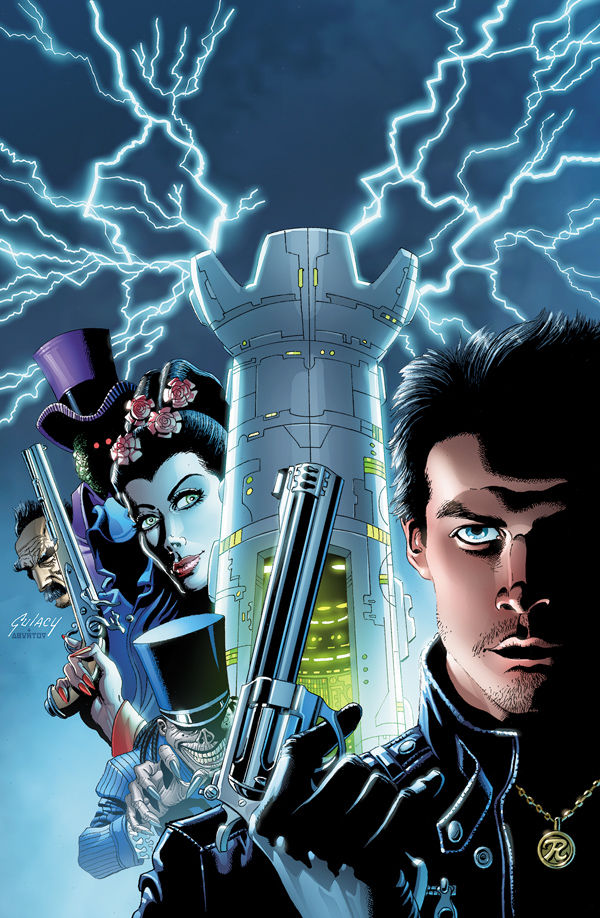ICv2 – a web site geared more toward the business side of comic retailing – recently caught up with Dark Horse Comics founder and CEO Mike Richardson to get his reflections on 30 years in the comics industry.
In Part One, he looks at how the business has changed over the past 30 years. In Part Two, he talks about Dark Horse today, which now has 150 employees and seen enormous success with key lines, such as Zelda, answers the exit question, and looks ahead at where comics will be 30 years from now, especially with regard to digital comics.
It’s a fascinating interview, in which Mike acknowledges the growing female readership that’s a big force in the industry and that that while it’s faded a little now, he thinks the shojo movement really brought a lot of women into comics.
“When I first heard that teenage girls were buying shojo in the bookstores, and sitting on the floors and reading them in the manga section, I had to see it for myself,” he recalls. “I went out to a local Borders and walked in, there were about 12 girls sitting on the floor reading manga.
“The shojo phenomena has faded from where it was at its height. I think it was aimed generally at teenage girls. Many of those girls are young women now and many of them stayed in the industry and became comics readers. There was some study I remember from the 90s that said that at the comic shops, nearly 90% of customers were male. I think this is a great thing to expand the readership and certainly something that the industry needed.
“The shojo movement also influenced a whole generation of female comic artists. You see the style has infiltrated probably every genre in comics when you see the female writers and artists gaining stature and being among the leaders in the industry.”
Mike talks extensively about how distribution has changed, particularly the loss of a wide range of different distributors, and how direct sales helped ensure company success, along with book store sales, to the point that Dark Horse publications are now on sale in over a hundred countries, putting out roughly 20 – 30 comic titles a month “and maybe 10 – 20 trades.”
“Bookstore distribution these days is a big part of our business for a variety of reasons,” he says.”The culture has changed, and by that I mean, not the comics culture, but our pop culture has changed. Bookstores are more willing to carry graphic novels, as you can see in any bookstore. We have a population that is older, has more disposable income, and is more willing to buy graphic novels, so it’s changed the market pretty dramatically.”
In Part Two, looking to the future, Mike feels it’s ” impossible” to anticipate what the technology will be in 30 years time.
“It’s impossible to know what the internet will be like then,” he feels. “We’re seeing great changes in the culture, and in the way entertainment is delivered.
“When we first started at Dark Horse, we were still on typewriters and pasting things up on light boards. I make myself sound like I’m old, but all this feels like five minutes ago. The time has gone by so fast.
“Content delivery is the whole thing,” he says of the way comics will be read, feeling print will still be around but the market won’t look the same as it does now.
“In the past, the distribution system has chosen the winners and losers, almost to the same extent that the consumers have, because at one time, finding a distributor of your work was very hard thing to do. Now anyone can put their work up on the internet and be found. We found many creators and many properties on the internet by individuals who were putting up and running them themselves so they have direct access to consumers.
“Obviously that’s changed the business,” he says, also arguing the pirating of comics, and the amount that goes is “astonishing” and does not have a positive impact when people take things that a creator puts their work into and needs to be paid, and it’s given away free without their permission.
“We’ve seen a change in the music business from the internet. We’ve seen it have an impact on the film business, and certainly it has an impact on comics,” he feels. “…Now we can print books on electrons and deliver them with ease. You never overstock, you never have to reprint; once you put them up, they’re there forever, accessible by anyone. My goal for our digital division was to have worldwide distribution of every book we’ve ever done in seven languages and that’s something that’s impossible with the old distribution system. Always available.”
It’s a fascinating interview for anyone interested in getting their work out their, now and in the future. Go and take a look.
The founder of downthetubes, which he established in 1998. John works as a comics and magazine editor, writer, and on promotional work for the Lakes International Comic Art Festival. He is currently editor of Star Trek Explorer, published by Titan – his third tour of duty on the title originally titled Star Trek Magazine.
Working in British comics publishing since the 1980s, his credits include editor of titles such as Doctor Who Magazine, Babylon 5 Magazine, and more. He also edited the comics anthology STRIP Magazine and edited several audio comics for ROK Comics. He has also edited several comic collections, including volumes of “Charley’s War” and “Dan Dare”.
He’s the writer of “Pilgrim: Secrets and Lies” for B7 Comics; “Crucible”, a creator-owned project with 2000AD artist Smuzz; and “Death Duty” and “Skow Dogs” with Dave Hailwood.
Categories: downthetubes Comics News, downthetubes News, US Comics


 FML, new creator-owned series from Kelly Sue DeConnick and David López, promoted with ingenious guerrilla marketing
FML, new creator-owned series from Kelly Sue DeConnick and David López, promoted with ingenious guerrilla marketing  Dark Horse, Hasbro, tease new Dungeons & Dragons, Magic: The Gathering projects
Dark Horse, Hasbro, tease new Dungeons & Dragons, Magic: The Gathering projects  Poison Ivy/ Swamp Thing Special creeps into comic shops in October
Poison Ivy/ Swamp Thing Special creeps into comic shops in October  Dark Horse announces Borderlands: Moxxi’s Mysterious Memento by Amy Chu, Mike Norton
Dark Horse announces Borderlands: Moxxi’s Mysterious Memento by Amy Chu, Mike Norton